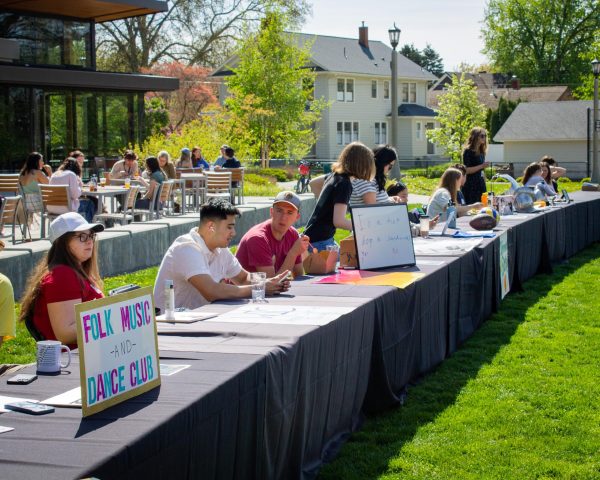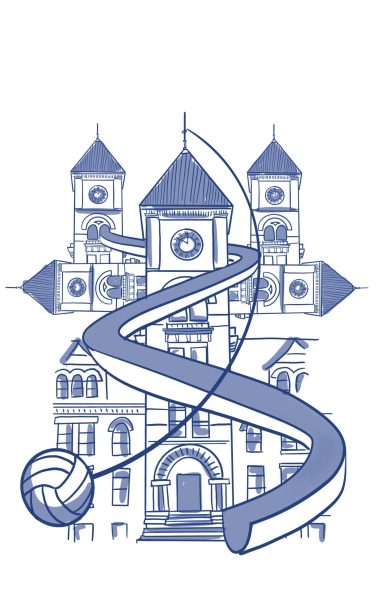The Dangers of Modern Journalism
November 27, 2018
On Oct. 2, 2018, Jamal Khashoggi — of the Washington Post — entered the Saudi Arabian consulate in Istanbul, Turkey. In the weeks following his apparent disappearance, rumours began to emerge suggesting that the journalist had be murdered and dismembered by agents of the Saudi Arabian government. It was not until Nov. 16 that the Washington Post, with the help of the CIA, concluded that these rumors were true.
Khashoggi was not the first journalist to be murdered in 2018, nor even the last. Washington Post foreign affairs reporter Amanda Erickson wrote, “the body of Bulgarian journalist Viktoria Marinova was found in Ruse, a city in the country’s north. Preliminary investigations suggest Marinova, who spent the past year reporting on corruption involving money from the European Union, was raped and beaten, then strangled.” Marinova and Khashoggi are only two of at least 43 journalists killed in their line of work in 2018 according to Megan Specia of the New York Times.
In addition, many journalists have been imprisoned for their work.
“Turkey is one major culprit, imprisoning more than 250 reporters for their work and often accusing them of things like ‘making propaganda for a terrorist organization,’” Erickson wrote.
President Erdogan and other Turkish officials were some of the first to claim that Khashoggi’s death was premeditated and carried out by a Saudi agents.
Forrest Holt, a reporter for the Walla Walla Union Bulletin, sees this as a power play for Erdogan. He worries that free press and journalism is being mediated by leaders that are opposed to both.
“What’s bothered me… is that the people that are left to defend journalism and defend the free press are Erdogan of Turkey and Trump,” Holt said. “These are people that don’t care about the free press, but these are the people that are left to defend it. Erdogan has pretended to care about the press and free journalism but how many journalists are killed or jailed in his country every day? He wants people to think he cares about it because it looks good for him.”
President Trump has foregone this tactic and, on a daily basis, insults and undermines the work of the free press. Despite the conclusions of the CIA, the Washington Post and other news sources, Trump has refused to punish Saudi Arabia and their leader, Crown Prince Mohammad Bin Salman Al Saud.
“If you look at my statement,” Trump said, in a statement to the press, “it’s maybe [the Crown Prince] did and maybe he didn’t… But he denies it. And people around him deny it. And the CIA did not say affirmatively he did it, either, by the way. I’m not saying that they’re saying he didn’t do it, but they didn’t say it affirmatively.”
Michael Slackman, the international editor of the New York Times, attributes this oppositional attitude to the rise of a more populist leadership. He emphasized that the New York Times does not consider itself as oppositional to any party or leader.
“At this moment in time we have seen — not just in the United States, but in the world — the rise of a more populist, right-leaning, some would call it strongman, political evolution,” Slackman said. “Those kinds of political systems, where they are reliant on a strong person — whether you want to call it authoritarian by form or function — tend to create conflict with the press. The press becomes seen by the political class as an adversary… We are not the opposition. ”
Slackman believes that this has created a phenomenon in political discourse.
“Whoever ordered [the murder of Khashoggi] believed that it wouldn’t cause an uproar, right? Why did they believe it wouldn’t?” Slackman asked. “Because, at this particular point in time, Washington is not seen as a tremendous supporter of press freedoms… In the US, when the president has a daily diatribe against or attack on the press, that has an impact, and it just makes [the job of a reporter] harder.”
The role of the reporter or journalist, is more important and more dangerous than ever, but a common question has arisen both within journalists and the public: should the press remain neutral, and what does neutrality mean within this current political climate?
Holt is a graduate of Washington State University — as a student journalist, he covered the first pro-Trump events held by the College Republicans.
“When I went to [a tabling event], it was two people from the College Republicans standing behind a table and a big crowd of people yelling at them,” Holt said. “In that instance, we’re not talking about being neutral, we’re talking about saying what happened: this is an organization that now supports Trump — they have faced all these accusations of being complicit in a campaign that is prejudiced in so many ways.”
The president of the College Republicans would go on to march at Charlottesville in the “Unite the Right” rally on Aug. 11 and 12, 2017. Holt clarified his position on neutrality as a journalist: he sees it as having a greater effect on the current political discourse.
“In instances like this, being neutral would be something where we give equal space to both sides and qualify them equally in our writing, and I don’t think that’s our job,” Holt said. “It’s not our job to give both sides equal space, it’s our job to give both sides space proportional to their influence in the conversation. It’s also our job to make sure that objectively, overtly racist things and actions like marching with the Nazis at Charlottesville don’t go overlooked for the sake of neutrality.”
What then is the role of the journalist? Slackman believes that the role of journalism has not been changed by the current political discourse. Instead, he sees a new clarity to the work that foreign and domestic reporters carry out.
“The role of the journalist is more important today than probably any time in my lifetime. Not just because what is happening in this country, but, I think, because of what’s happening around the world and what’s happening with technology,” Slackman said. “I am the international editor [of the New York Times] and what I think a lot about is what it means to have foreign correspondents spread around the world: why are we out there, right? Broadly speaking, our aim is to bear witness; it’s to hold the powerful to account; it’s to give voice to people who would otherwise be forgotten; it’s to help explain an increasingly complicated and interconnected world to each other, and the fifth thing as an international editor is to help explain what is happening in this country to the rest of the world. Broadly speaking, that’s our mission.”
Dian Ver Valen, the News Editor of the Union Bulletin, is also of the opinion that the role of journalism hasn’t changed because of political discourse. Rather, journalism — particularly print journalism — is now both threatened and upheld by social media.
“This freedom [of social media] has created a number of problems for the institution of journalism,” Ver Valen said. “First, people don’t want to pay for their news anymore and so many news organizations are going bust. Second, social media is the perfect environment for sowing discord and fanning the flames of hate, so we’re seeing more and more divisiveness as a society. I’ll say, however, that social media also has the power to bring people together in a strong way. But then we have the lies, half-truths, fiction and unsubstantiated gossip that runs rampant on social media platforms.”
Slackman similarly acknowledged the role of social media and the duality of its purpose. For the New York Times, Facebook, Twitter, and other social media platforms are a conduit for information; journalists can quickly get a story to their audience. However, social media has also allowed radical groups, such as Nazis and White Supremacists, to find a common home for their rhetoric.
“What Facebook has done — it has allowed those people to create virtual communities online: they fuel eachothers extremist ideas and avoid judgement from others around them,” Slackman said. “Technology as a tool of journalism is powerful, but there are issues that society needs to deal with when it comes to social media. Facebook has become the arbiter of political discourse around the world. How did that happen? How did a bunch of millenials sitting in a glass office in California decide what people in Sri Lanka get to see? Where is the transparency there?”
Globally and locally, journalists are faced with the task of informing their public and ensuring transparency. Journalism will continue to evolve with technological advancement, but the purpose remains the same — it’s just harder and far more dangerous.
“I think journalists have a really big task right now because there’s a real lack of information and a wealth of misinformation,” Holt said. “So, journalists have a herculean task in front of them to not only ensure that people know when they are being misinformed, but also help inform people on things that matter to them everyday.








